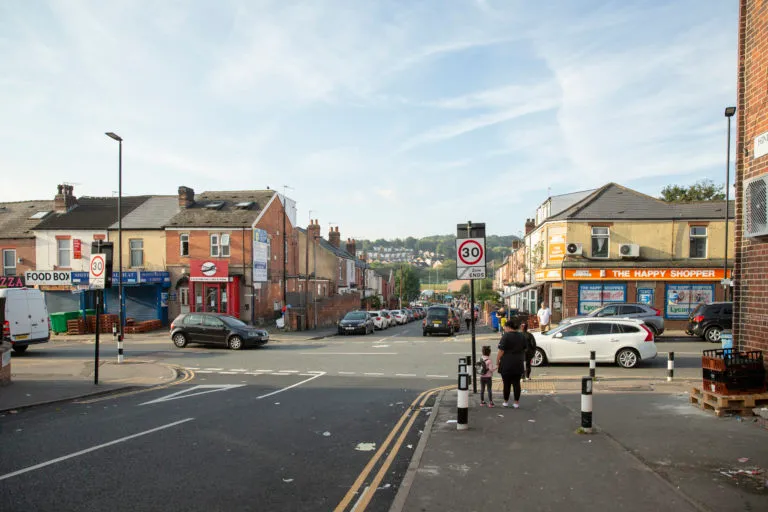Levelling up starts with home
Published: by Alastair Harper

Today we’ve published a new report looking at what an unlevel country is doing to the people who live in it. To do this we’ve pointed a spotlight on three key places: Burnley, Plymouth and Sheffield.
It’s just a snapshot. But one which illustrates the experiences of millions of people across England who are fighting to do their best with the odds very much stacked against them. In particular, the case studies reveal the housing problems we see growing in other places the government identifies as ‘left behind’. These include unaffordable tenancies, shoddy temporary accommodation and people languishing on social housing waiting lists for years.
And together they illustrate how vital social housing is for helping tackle that injustice.
Why Burnley, Plymouth and Sheffield?
Burnley is in Lancashire where we have an advice hub. Surprisingly, we are hearing from owner-occupiers that they are struggling. Their owned homes are, by and large, old and leaky. Three quarters were built before 1919, compared to less than a quarter across all of England. Partly as a result, the town is in the top 15 for highest fuel poverty in the country as they pay to heat poorly insulated homes.
Meanwhile, those on the lowest-incomes are faced with a cruel choice. Choosing between decent but unaffordable properties on the outskirts, or unsafe and unhealthy cheaper housing in the centre. We heard from a father named Spike who’s living in a cramped flat with his son. The homes Spike can afford aren’t fit to live in, and all the decent ones are just too expensive.
Things are no better on the South coast. In Plymouth we heard the impact on a young mother, Katie*. Katie is forced from different short-term tenancies, and each time prices going up. She is unable to find security for her two children.
Many have turned to us for help and we do what we can. But the problem won’t be solved until its root cause is recognised and there are enough secure, genuinely affordable homes for the people in that community.
Finally in Sheffield we met a mother who explained that she has spent years moving from short-term lets to emergency accommodation and back again. She is managing to give a sense of home to her two children as best she can. Things were only getting harder as the price of private renting went up and the stock of social housing plummeted as she waited on a barely moving waiting list for what felt would be a lifetime.
What is levelling up?
Three very different parts of the country with different economies and geographical landscapes, all facing the same emergency in their housing. But is there a plan for dealing with it?
Levelling up is a clear and consistent call to arms from the government. From the prime minister down, it is the Conservative response when asked how they will repay those formerly Labour-voting areas who put their faith in them.
But what exactly does that mean to the government? Well, the minister responsible has stuck a tweet at the top of his profile to answer. It means empowering local leaders, growing the private sector and living standards, spreading opportunity and improving public services and it means restoring local pride.
What’s levelling up got to do with housing?
Does that practically answer the question of the renters in Burnley? People wondering if they’ll be out of fuel poverty anytime soon? Does levelling up including levelling up our nation’s housing offer?
For the government’s sake it had better become a clear yes. Our report shows how a lack of secure, genuinely affordable housing is already holding people back. Even in places deemed ‘affordable’ by government housing policy.
And as levelling up moves from promises into hard investment, there comes with it new risks. Pour millions into transport infrastructure and town centres without protecting housing costs and residents are priced out and forced elsewhere. Just as happened before in London and Manchester.
To truly level up, we need to build social housing
But there is hope that government actually gets what’s needed – or is beginning to. A few days ago the new housing secretary appeared before a group of MPs to be grilled on his intentions with regards to their department. He talked about the problems people face in housing and rightly pointed to the positive role social housing can play in people’s lives. ‘Housing costs are lower, capacity to save is better, capacity to move into ownership is better.’ He told the committee that social housing is urgently needed.
This is a great start.
And there’s so much he can practically do to help meet that need. Both Plymouth and Burnley, for example, are not even allowed to have access to the government’s grant money at a level that will pay for social housing because of harsh geographical restrictions.
The money that Sheffield can get is often not enough to make building social housing viable in the city, due to the way funding is allocated. These rules mean very few social homes actually get built in these places. When we factor in the social homes lost through sales under the Right to Buy, Sheffield has lost over 1500 social homes in just 5 years. All the while the numbers claiming housing benefit, funnelling public money into the pockets of private landlords, continues to rise.
To truly level up the country, we have to reverse these trends. The government, and the new secretary of state, can show they have the vision to fix all of this as they show us their plans. And they will best do so by making clear that, for them, levelling up starts with home.
More stories on housing’s role in Levelling Up will follow but for now sign up to join the fight for social housing.
*name has been changed.